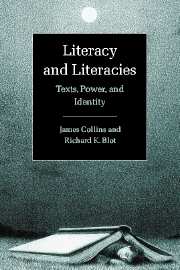Book contents
- Frontmatter
- Contents
- List of figures
- Foreword by Brian V. Street
- Preface
- Acknowledgments
- 1 Introduction: texts, power, and identity
- 2 The literacy thesis: vexed questions of rationality, development, and self
- 3 Situated approaches to the literacy debate
- 4 Literacies and power in modern nation states: Euro-American lessons
- 5 Literacies and identity formation: American cases
- 6 Literacy, power, and identity: colonial legacies and indigenous transformations
- 7 Conclusion: literacy lessons – beginnings, ends, and implications
- Notes
- References
- Index
- Studies in the Social and Cultural Foundations of Language
1 - Introduction: texts, power, and identity
Published online by Cambridge University Press: 22 September 2009
- Frontmatter
- Contents
- List of figures
- Foreword by Brian V. Street
- Preface
- Acknowledgments
- 1 Introduction: texts, power, and identity
- 2 The literacy thesis: vexed questions of rationality, development, and self
- 3 Situated approaches to the literacy debate
- 4 Literacies and power in modern nation states: Euro-American lessons
- 5 Literacies and identity formation: American cases
- 6 Literacy, power, and identity: colonial legacies and indigenous transformations
- 7 Conclusion: literacy lessons – beginnings, ends, and implications
- Notes
- References
- Index
- Studies in the Social and Cultural Foundations of Language
Summary
Puzzles and pluralities of literacy
Literacy is a curious thing. It seems to envelope our lives and be central to modern living, yet most of humanity has done without it for most of human existence. As a term, it points to a striking range of possibilities – such that we now speak not only of “school literacy” and “vernacular literacy” but also “cultural literacy,” “computer literacy,” “moral literacy,” and even “emotional literacy” (Steiner, 1997). But the term is also subject to notable recent efforts to define and restrict its essence, for example, through legislating a particular way that reading or writing must be taught in school. As a field of study, literacy entangles some of the most difficult problems in social analysis – among them the question of text, that is, of language, situation, and meaning – yet it is also a very familiar topic, the source of many proclaimed crises and the subject of many slogans and sound-bites about how to live, raise children, and prepare for the rigors and excitements of the new century.
Literacy often seems to pervade our lives. Increasing numbers of people make their living interacting with a computer screen. Many find reading a welcome escape, and they “bury” themselves in a good book, perhaps a romance or a futuristic fantasy or, if young, a tale of the wise doings of the cleverly marketed Harry Potter.
- Type
- Chapter
- Information
- Literacy and LiteraciesTexts, Power, and Identity, pp. 1 - 8Publisher: Cambridge University PressPrint publication year: 2003



